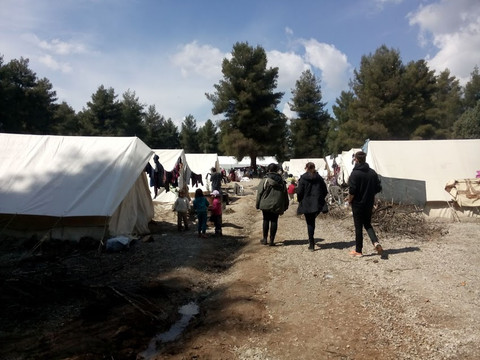The European Commission says Greece will still be required to assess individual claims after Athens declared Turkey a safe country for refugees.
“I think it is not something very strange with this decision,” EU home affairs commissioner Ylva Johansson, told reporters on Tuesday (8 June).
“That means of course that there can be a swift approach for returns but still it needs to be an individual decision for each individual,” she added.
The decision by Athens to claim Turkey a safe country targets asylum seekers from Afghanistan, Bangladesh, Pakistan, Syria and Somalia.
“They are not considered to be in any danger in the neighbouring country due to their race, religion, citizenship, political beliefs,” said the Greek foreign ministry and the migration ministry on Monday.
Greek authorities can now reject as “inadmissible” asylum claims lodged by these five nationalities. It means they will not have to look into the merits of their cases.
Johansson appears to say the opposite in her statement, posing further questions on how this will pan out in the EU’s stalled migrant swap deal with Turkey.
However, the new Greek rule still allows the nationalities to protest their “inadmissible” asylum claims.
But it means they will have to prove they are not safe in Turkey, complicating their applications.
It is unclear if Johansson was advocating for this, in her statement.
And the European Commission was unable to provide further clarity on the matter, when pressed for comments earlier on Tuesday.
‘Incompatible with EU law’
But Minos Mouzourakis, a legal and advocacy officer at the Refugee Support Aegean NGO, says the decision by Athens runs counter to EU law.
In an email, he said the safe third country concept, as proposed by Greece, is “incompatible with EU law”.
And an analysis on Turkey by the Brussels-based European Council on Refugees and Exiles (Ecre), sheds doubt on its new status as a safe country.
Turkey is host to over 3.5 million refugees from neighbouring Syria, as well as hundreds of thousands of other nationalities mainly from Afghanistan, Iran and Iraq.
But due to Covid, many are unable to access to asylum and registration in Turkey.
Others, including Syrians, have reportedly been returned to their home countries against their will. Syrians have a special temporary protection status in Turkey, unlike other nationalities.
Meanwhile, Turkey has refused to accept anyone from the Greek islands since March 2020. It says this is due to Covid.
Athens had earlier this year pressed Turkey to accept the immediate return of some 1,450 under the EU deal. Ankara refused.
Around 9,000 asylum seekers and migrants are currently on the Greek islands of Lesbos, Chios, Kos, Leros and Samos, down from around 40,000 last year.
“We cannot allow them to become overcrowded buffers ever again,” Greece’s migration minister Notis Mitarchi told the European Parliament last month.
The UN Refugee Agency (UNHCR) says some 47 percent of those in the Greek island camps are Afghans. Another 15 percent are from Syria, while 9 percent are from Somalia.
The latest move comes amid further efforts by the Greek government to prevent asylum seekers from entering the country.
It has shored up border controls along with the help of the EU’s border agency Frontex and rolled out sound cannons mounted on armoured vehicles to deter migrant entries.
European Asylum Support Office
The issue of Greece designating Turkey as a safe country was not discussed at a meeting among EU home affairs ministers in Luxembourg, also on Tuesday.
On migration matters, the ministers instead appeared closer to reaching an agreement on a reformed EU Asylum Support Agency, Easo.
Ministers from Spain, Italy, Greece, Malta, and Cyprus had jointly signed a letter declaring their support for the new agency.
Eduardo Cabrita, speaking on behalf of the Portuguese EU presidency, described it as a breakthrough.
“They’ve agreed to move ahead with Easo regulation,” he said.
The new agency will have an expanded roll on screening applications.
A final political agreement on Easo is expected to take place under the incoming Slovenia EU presidency.
By NIKOLAJ NIELSEN
Source: EU Bbservr



